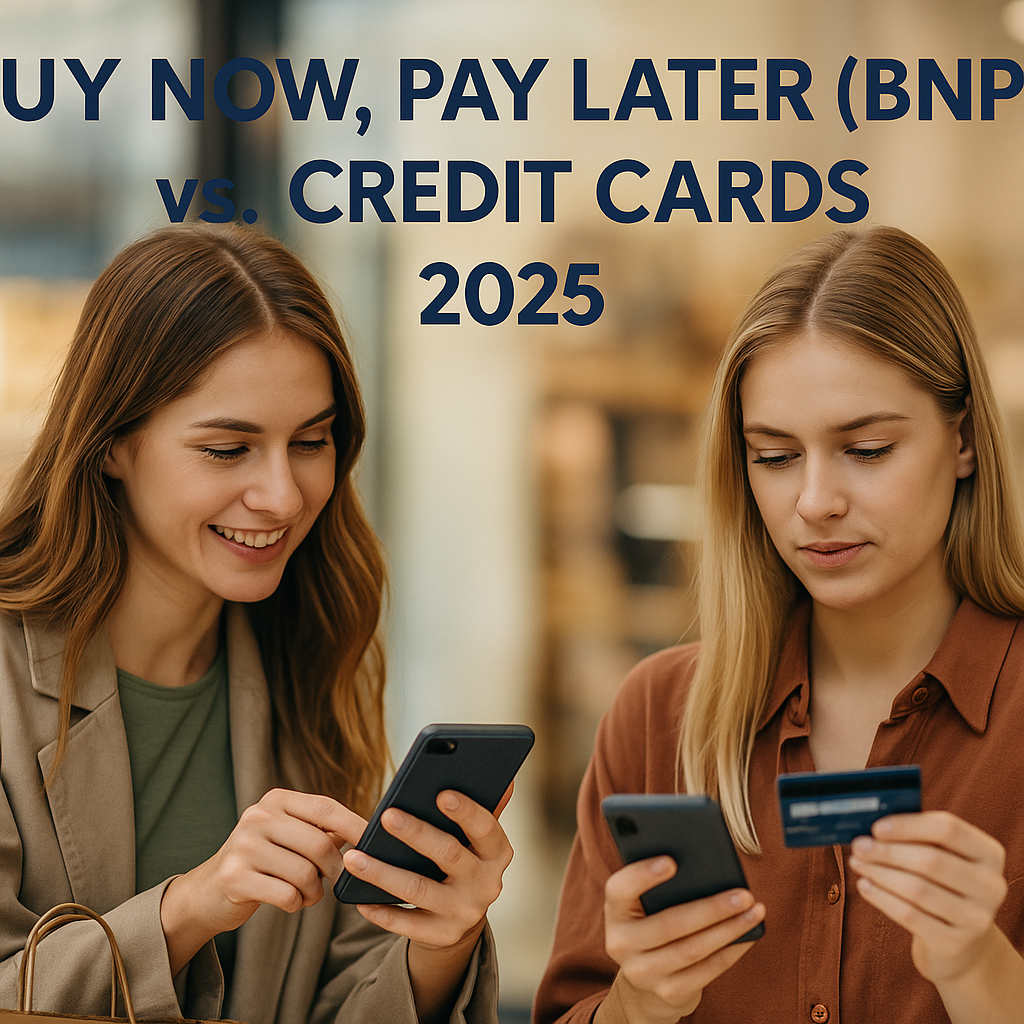
Buy Now, Pay Later vs. Credit Cards: What’s Better in 2025?
In 2025, payment options are more flexible than ever. At checkout, you’re no longer just pulling out a Visa or Mastercard. Now, apps like Afterpay, Affirm, and Klarna offer something different: Buy Now, Pay Later (BNPL). These tools let you split a purchase into installments—often interest-free.
So the question is, should you stick with your credit card or try BNPL?
Let’s compare both head-to-head. We’ll look at fees, interest, credit score impact, budgeting pros and cons, and when each method makes the most financial sense.
What Is Buy Now, Pay Later (BNPL)?
BNPL lets you break a purchase into multiple payments—often 4 bi-weekly payments or longer-term monthly plans. It’s become popular for online shopping, especially among younger shoppers.
Popular BNPL apps in 2025:
- Klarna
- Afterpay
- Affirm
- Apple Pay Later
- PayPal Pay in 4
You typically get approved instantly at checkout, with no hard credit check.
What Is a Credit Card?
A credit card lets you borrow up to a limit and carry a balance, with interest charged if you don’t pay it off. It also offers:
- Rewards (points, cashback)
- Credit score building
- Consumer protections
Used responsibly, credit cards can be a powerful financial tool. Used poorly, they can bury you in debt.
Comparison Table: BNPL vs. Credit Cards
| Feature | Buy Now, Pay Later | Credit Cards |
|---|---|---|
| Interest | 0% (short term), 10–36% (long) | 20–29% average |
| Fees | Late fees common | Late fees + potential penalty APR |
| Approval | Soft check (usually) | Hard inquiry affects credit |
| Credit Building | Limited | Builds credit history |
| Rewards | None or limited | Cashback, points, miles |
| Purchase Protection | Some apps offer | Strong consumer protections |
| Flexibility | Fixed installment dates | Revolving, flexible repayment |
| Risk of Overspending | High | High |
When BNPL Might Be Better
- You want a short-term, interest-free payment plan
- You don’t qualify for a credit card
- You’re buying something small ($30–$400)
- You want a clear payoff date
BNPL is ideal for budgeting if you’re disciplined. But it doesn’t build credit, and multiple BNPL accounts can quietly snowball into debt.
When Credit Cards Might Be Better
- You want to build credit over time
- You can pay the balance off monthly
- You value rewards or cashback
- You want strong purchase protections
Credit cards offer more flexibility and better long-term benefits—but only if you pay off the balance consistently.
Bar Chart: U.S. Usage Rates (2025 Estimate)
| Payment Type | % of Adults Using |
|---|---|
| Credit Cards | 72% |
| BNPL | 38% |
Usage of BNPL is rising fast, but credit cards remain dominant—especially for travel, recurring bills, and emergencies.
What About Credit Score Impact?
- BNPL: Most short-term BNPLs don’t report to credit bureaus (yet). Longer plans with Affirm and Apple Pay Later may report.
- Credit cards: All major cards report monthly and help build credit history and utilization.
If you’re working on your credit score, credit cards are still more effective.
Hidden Costs and Pitfalls
BNPL
- Multiple purchases across apps = budget chaos
- Some charge late fees even on small missed payments
- May lead to overspending (low up-front costs encourage impulse buys)
Credit Cards
- High interest if you carry a balance
- Complex fee structures (e.g., foreign transaction, balance transfer)
- Easy to overspend with large limits
Tip: Always read the fine print—especially with promotional 0% offers.
How to Use Each Option Wisely
BNPL
- Use only for planned purchases
- Never stack more than 2–3 active payment plans
- Turn on payment reminders to avoid late fees
Credit Cards
- Set up autopay for at least the minimum
- Use only for what you can pay off monthly
- Focus on cards with no annual fee and rewards that match your lifestyle
Final Verdict: Which One Is Better in 2025?
It depends on your habits and goals.
- Use BNPL if you’re making a small, budgeted purchase and want simple, interest-free payments.
- Use credit cards if you can pay off your balance, want rewards, and are working on your credit score.
The key is not what you use—but how you use it.